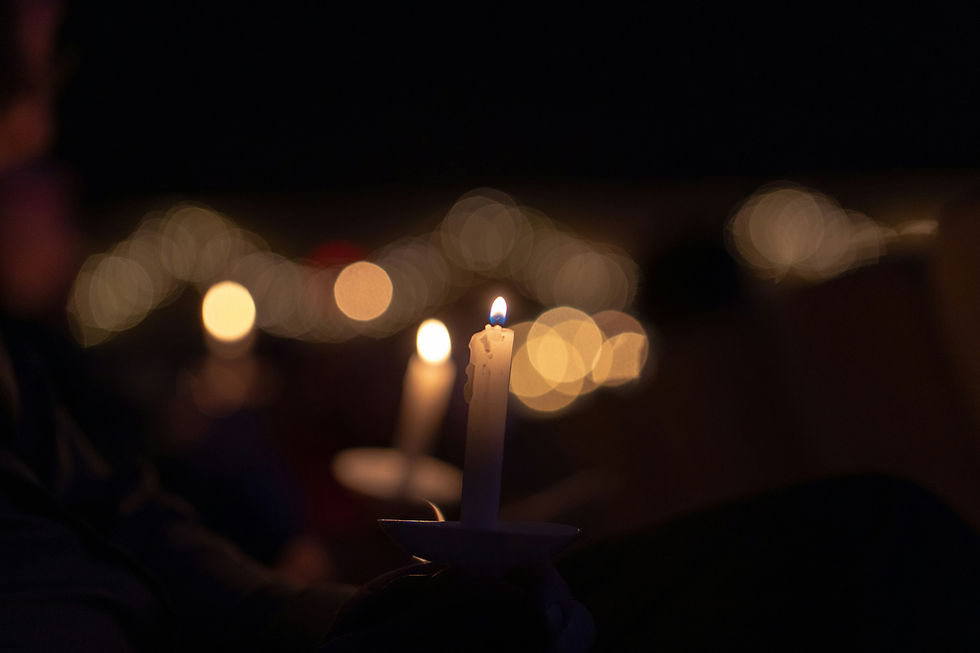A Thrill of Hope
- Pastor Serena Rice

- Dec 24, 2024
- 6 min read

A sermon on luke 2:1-20
[For an audio recording of this sermon click here. Photo by Tim Umphreys on Unsplash.]
Throughout the season of Advent, here at Abiding Peace, we have been talking about practices of hope:
the actions we take and the patterns we foster in order to cultivate in our souls the kind of living hope that can change the way we respond to challenges and interact with the world.
We have explored hope as the practice of staying alert for the signs of God’s work in the world (and for the ways that we can join that work);
We have heard an invitation into hope in John the Baptist’s call to repent by changing our patterns of thought about where to look for security and meaning-making;
We have heard the question “what then should we do?” as an expression of hope that change really is possible;
And, in our pageant on Sunday, we found in Mary’s Magnificat the pattern of God’s work in and through humanity that guides and grounds our hope as much today as it did for her 2,000 years ago.
You might think, after 4 weeks, that there’s not much more to say about hope.
But we have been talking about Advent hope… the active, even demanding, hope of preparation...
And tonight is about the hope that we have been preparing for: the thrill of hope that makes a weary world rejoice.
In case you don’t recognize it, I am quoting my favorite line of any Christmas carol, O, Holy Night, which celebrates: a thrill of hope the weary world rejoices.
Just eight words that capture the world-shifting change that we celebrate this night:
The arrival of a hope so present that we cannot help but thrill in response…
A hope so real that it can turn the weariness of an entire world into rejoicing.
This is a hope that demands nothing of us, except our unguarded attention to the miracle of God here, with us, completely.
Nevertheless, I do realize that it can be hard to summon that unguarded attention… to surrender ourselves to the vulnerability of that thrill of hope.
In part, that challenge is because there is nothing unexpected in a story we have heard in the same words year after year.
We feel no anxiety about the baby being laid in a manger because there is no room in the inn.
We aren’t surprised when an angel appears suddenly in the field with the sheep and their shepherds.
We can recite the heavenly chorus’s song right along with them: “Glory to God in the highest, and peace to God’s people on earth.”
It’s such a familiar story, and while that familiarity can be comforting… comfort it not usually accompanied by a thrill.
There’s nothing to make us gasp with joy, overwhelmed because our sense of reality has shifted and we suddenly see a possibility, a hope, we had never imagined possible.
If Advent hope called us to act, Christmas hope calls us to awe… and I think that might be the harder call to answer.
So, I want to ask you to try to suspend everything you know about the story of the first Christmas night, and to try to imagine experiencing it as a shock… as a sudden, unheralded intrusion into an otherwise weary, ordinary life.
The Shepherds can be our guides into this thrill of hope because they had no prior warning that God was planning to change the world that night.
Mary and Joseph had had their angelic visitations months before. They knew they had central roles to play in God’s divine story.
But the shepherds… they were just living in the fields, keeping watch over their flocks, on an ordinary night.
And while the details of that situation are probably outside any of our experiences, I think the ways that they reflect a weary world might be more relatable:
The drudgery of tasks that are necessary for survival but without much inspiration or deep meaning.
The mundane reality of physical discomforts mediated through the indignity of bodies that get stiff, and dirty, and cold.
The isolation of existing on the margins of a community, longing for an inclusion that, maybe sometimes feels a bit out of reach.
The specifics that add weight and drag to our lives might look different, but I expect we can all identify with the weariness.
So, imagine that weariness, of yet another uncomfortable night like every other night, sitting like a weight on your soul… when suddenly the familiar darkness is split by a heavenly vision of overwhelming glory.
I imagine our hearts would all thrill… but maybe not with hope… not yet. Sudden fear comes as a thrill as well.
A jolt that makes us gasp for breath; muscles clenched for fight or flight.
The desperate need to know what is happening, so that we can know how to respond.
This is the instinctive reaction of a weary world, isn’t it? We see something unexpected, and we expect the worst.
We’ve learned to fear what we don’t recognize or understand.
We’ve learned that we cannot let trust, or hope, be our first instinct.
But then, anticipating our need for reassurance and guidance into a less reactive response, the angelic visitor tells us: “Do not be afraid.”
What is happening is not a reason for fear; it’s a reason for joy.
This is GOOD news, for us and, somehow, inexplicably, for ALL people.
The promised Savior, God’s representative who will save us from our weariness and our fears … is no longer a distant, future assurance. He is HERE in our own town.
Does the thrill start to shift from trepidation to excitement?
Can you feel your breath catch at the possibility that something life-changing really has intruded into your tired, familiar night?
Do you feel the swell of rejoicing beginning to build in your chest?
I can.
But then, the angel does another unexpected thing: he offers us a sign to assure us of the clear and present reality of this hope… but it’s not a sign we would ever expect as evidence that we can safely set aside our fear.
He tells us we will find a child wrapped in the bands of cloth used to soothe and warm a newborn, and that he will be lying in an animal trough.
It’s a bizarre juxtaposition:
The declaration of God’s act of ultimate salvation…
And the description of such an utterly vulnerable vessel for that deliverance.
I think maybe that’s why the first angel needed the back-up chorus… needed a bit more evidence that this message came from the God of the universe, who has the power to make good on the promise that this announcement was good news.
And so, the angelic host sings of God’s glory, and of peace for us… and when they have gone there is an expectant silence.
Because we have a decision to make.
Will we hold on to the self-protective, world-weary habits that are uninspiring but familiar?
Or will we give hope our unguarded attention?
Will we lower our defenses and let ourselves feel a hope that breaks all the rules of expectations… because we are starting to understand that those rules are the things that have made our world so weary.
The rules that teach us to expect vulnerability to be powerless, and thus a cause for fear.
The rules that have convinced us to give up on real peace and settle only for a relative absence of conflict.
The rules that dull our capacity for a thrill of hope because we don’t really expect God to change the world tonight.
In the story, the shepherds show us that it is possible.
They let go of their fear, and they trusted the unlikely sign, and they went to see the thing they somehow trusted had taken place just as the Lord had made known to them.
And because they went… because they gave this world-changing hope their unguarded attention, they got to see Jesus, and to share their story, and when they got back to those fields with their sheep they weren’t weary anymore.
They were glorifying and praising God. They were rejoicing in hope.
And we have that same opportunity.
Whatever weariness has gripped our souls… whatever fear or apathy holds us back from the thrill of hope… tonight Christ is born among us.
God’s gift of presence in our lives, fragile and vulnerable as it seems, can change everything.
If we will truly let ourselves rejoice in that hope.
Thanks be to God.



























